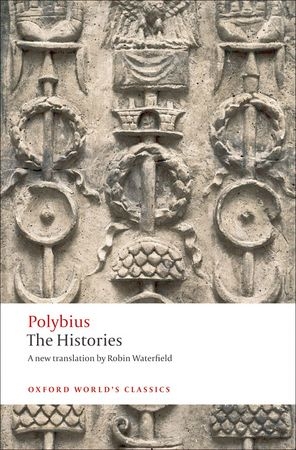 “no one else in our times has attempted to write a universal history”
“no one else in our times has attempted to write a universal history”
Polybius’ ambitious goal was to describe how Rome conquered the Mediterranean world in less than fifty-three years.
This great study of imperialism takes the reader back to Rome’s first encounter with Carthage in 264 and forward to her destruction of that renowned city in 146.
Polybius, himself a leading Greek politician of the time, emphasizes the importance of practical experience for the writing of political history as well as the critical assessment of all the evidence. He attributes Rome’s success to the greatness of its constitution and the character of its people, but also allows Fortune a role in designing the shape of world events.
This new translation by Robin Waterfield, the first for over thirty years, includes the first five books in their entirety, and all of the fragmentary Books 6 and 12, containing Polybius’ account of the Roman constitution and his outspoken views on how (and how not) to write history. Brian McGing’s accompanying introduction and notes illuminate this remarkable political history.
To listen to this audio guide to Polybius, click on the links below:
approaching polybius
1. I began by asking Brian McGing how he came to work on Polybius in the first place. Click here to listen [1:21].
2. Is Polybius a difficult writer to get to grips with? Click here [2:46].
3. What does Polybius’ claim to belong in Oxford World’s Classics rests on? Click here [3:02].
polybius’ world
4. What were the power dynamics of the Mediterranean world which Polybius wrote about? Click here [4:48].
5. Next I asked whether it was right to see the question that Polybius was pursuing as a pressing political one – accounting for the rise of Rome – rather than an abstract historiographical one. Click here [4:08].
6. What qualities did Polybius think important in a good historian? Click here [2:45].
7. Polybius was interested not only in topography as a way of explaining battles, but also geography at a higher level. Brian McGing explains that interest here [2:20].
8. The point of Polybius’ work is to explain the rise of Rome to pre-eminence in the known world. Did Polybius see a role for fate or fortune in that rise – did he think the city was destined for greatness? Click here [5:18].
reading polybius
9. What readership was Polybius writing for? And how does his work come down to us? Click here [7:37].
10. Brian McGing discusses the history of Polybius translations into English. Click here [3:27].
11. Finally, Brian McGing reflects on this, the first new translation of Polybius in thirty years. Click here [5:05].
